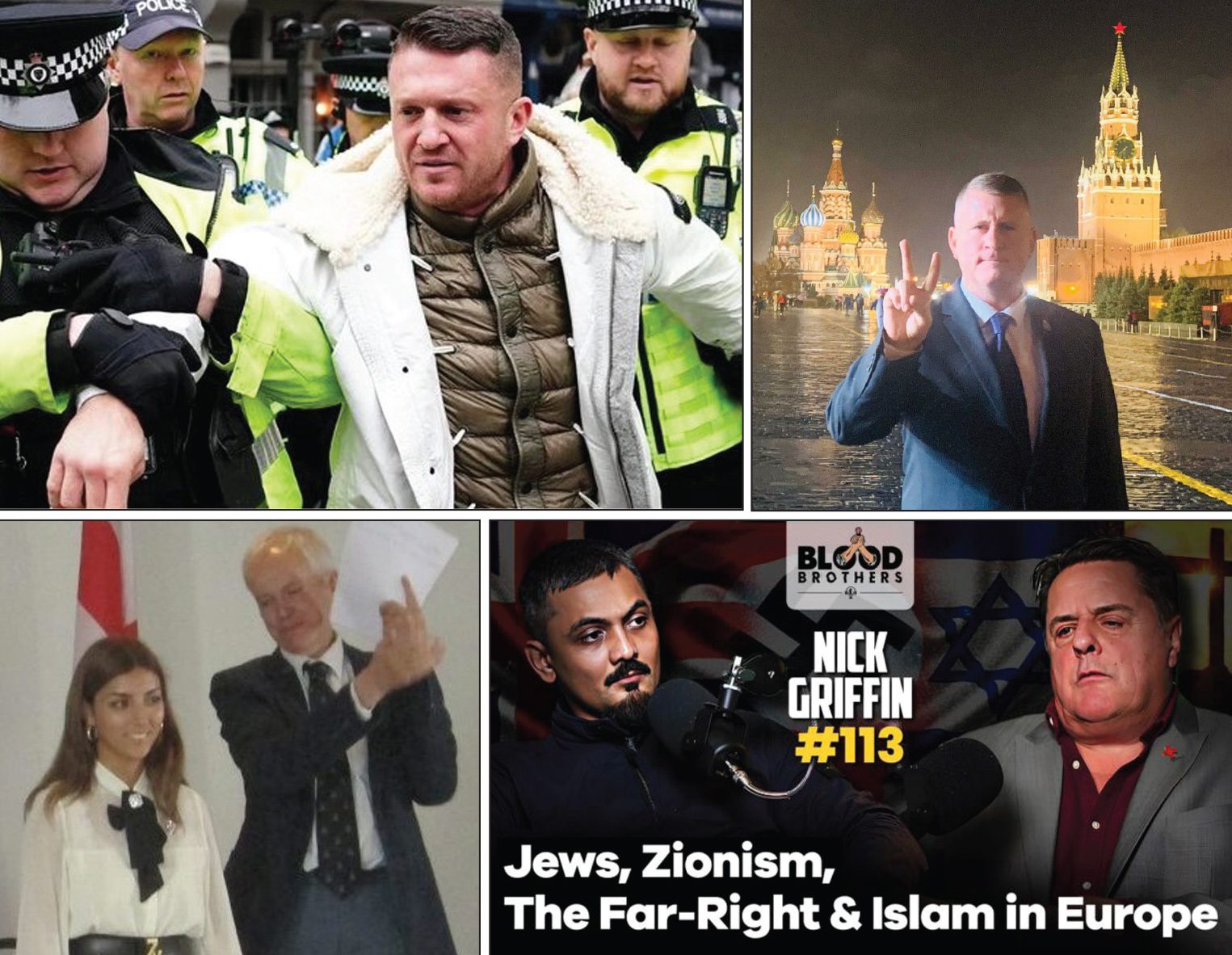The far right is seriously divided over current international events, leading to a peculiar mix and match of ideas. Paul Gale offers a guide to the resulting factions

Which corner? In the Pro-Putin Zionist camp, Tommy Robinson (top left) and Paul Golding (top centre); in the pro-Putin anti-Zionist camp, Nick Griffin (above, right) during a podcast with Islamist and conspiracy theorist Dilly Hussein; and in the pro-Ukraine anti-Semitic faction, Peter Rushton with Isabel Peralta (above left) Images: X/TouTube
International events are creating a four-way split within the far right. When your politics are based on hate, it can be difficult to decide whom you hate most.
Your average British bonehead basically hates Muslims. One reason for this is that the mainstream media has taught him – and, just this once, readers will have to forgive the sexist language, because on this wing of the far right it does tend to be mainly “him”, even in 2024 – that it is possible to get away with racism when it’s cloaked as opposition to “radical Islam”.
Although the years (and lifestyle choices) are catching up with him, Tommy Robinson remains the “leader” of this yob army. In November, he summoned the nation’s football gangs and cokeheads to “defend the Cenotaph” from an invented threat. Then, at the end of the month, he tried to muscle in on a rally against anti-Semitism, but was quickly removed from the scene after organisers took a commendably united stance against his vile Islamophobia.
One of Robinson’s main critics is Mark Collett of Patriotic Alternative, who still sees Robinson as his most obvious rival for the allegiance of young racists, whether online or on the streets. Collett tried to persuade his readers to reject Robinson’s calls to descend on London, and accurately mocked the former EDL boss’s charade of turning up for the demo briefly, then making a quick getaway in a taxi before the arrests began.
This is more than just a macho stand‑off between two middle-aged racists, each seeking leadership of impressionable young men.
It is just one part of a broader set of divisions within the far right over how to respond to Middle East conflicts and to Russia’s invasion of Ukraine. The ensuing four-way split partly reflects the efforts of old-school nazis to retain relevance in the 2020s, as against contrarians and conspiracy theorists whose ideology is anti-system, and conservative racists who are trying to mobilise populism for both electoral and fundraising strategies.
Pro-Putin Zionist camp
In one corner we have Robinson and his imitators such as Britain First. As an extension of their Islamophobia, they profess devotion to Israel, especially in wartime, and for years they also expressed admiration for Russian President Vladimir Putin.
Robinson and a few others have sometimes tried to build connections with the outer right-wing fringe of Zionism, although the former EDL leader was firmly told to stay away from a recent demonstration against anti-Semitism that was backed by a broad range of Jewish community organisations.
Despite Robinson’s insistence that he is a Zionist, he was himself briefly in the anti-Semitic British National Party, and Paul Golding, leader of Britain First, was for years a BNP official working closely with one of Britain’s leading Jew-baiters, Nick Griffin. Golding now tries to play down his support for Russia, but he is on record as expressing his admiration for Putin and has visited Moscow several times.
Overt Zionism, combined with semi-disguised support for Russia, is increasingly common among European far-right parties that Golding hopes to imitate (or at least hopes to convince his donors that he has a chance of emulating). Marine Le Pen in France, Alternative for Germany (AfD) in Germany and the Austrian Freedom Party are among the leading examples of this tendency, but even they occasionally struggle to disguise their anti-Semitic roots.
Pro-Putin anti-Zionist camp
In the second corner is a pro-Putin but anti-Semitic (or, as they would put it, anti-Zionist) grouping. This is the largest faction among the traditional British far right, including the relics of the old National Front and BNP. Griffin and his business adviser, Jim Dowson, having abandoned their temporary façade of philo-Semitism, are among this faction. Also counted among them is Griffin’s enemy and former comrade in the NF’s “political soldier” faction Colin Todd, who after a spell in prison is back editing Candour.
Another of Griffin’s friends-turned-enemies, PA leader Collett, is also in the club of Moscow-loving Jew-haters, and frequently broadcasts on these topics with former Ku Klux Klan leader David Duke.
Most of the conspiracy theorist far right (Michèle Renouf, James Thring, Nick Kollerstrom and other such nutters) are in the same club, although they usually talk only to themselves at events such as Keep Talking, which is still held at the Vauxhall Tea House, a stone’s throw from MI6.
Overseas, the leading examples of this tendency include a network of extremist parties organised by Roberto Fiore, leader of the militant Italian fascist party Forza Nuova, who has close links to both Moscow and Putin’s ally, Syrian dictator Bashar al-Assad. Germany’s oldest nazi party the NPD was the largest group in Fiore’s network, although it has for years haemorrhaged support in both directions, to the more mainstream AfD and to several more extremist splinters. This year, the NPD renamed itself Heimat.
Pro-Ukraine anti-Semites
The third corner is pro-Ukraine and openly anti-Semitic. This quadrant includes those who would see themselves as national socialist purists. In Britain, its leading proponents include the League of St George, the British Movement, and Heritage and Destiny assistant editor Peter Rushton.
Overseas supporters of the same Putin-hating, Jew-hating tendency include the young Spanish nazi, Isabel Peralta; the NPD’s rivals on the German neo-nazi fringe, Dritte Weg (Third Way); numerous football hooligan gangs, and supposedly intellectual but violent fascists in France and Italy, Group Union Défense (GUD) and CasaPound respectively.
Leading Holocaust denier Germar Rudolf, who has been living in the USA for years, is also in this anti-Putin camp, and the issue is undermining plans for a revived international Holocaust denial network (as revealed by Searchlight two months ago). But those who would have to be the backbone of such a network are vocally committed to opposing sides in the Ukraine war.
Pro-Ukraine, anti-Muslim
The fourth corner represents the most commonly held views within mainstream politics, but the least common among far-right spokesmen. Those expressing pro-Ukraine but pro-Israel views can be found among British Democrats and on parts of the Alt-right, but are more frequently to be heard in parts of the European populist right, including some “ex-fascists”.
The outstanding example is Italy’s Prime Minister Giorgia Meloni, and the same line is also pushed by her far-right allies in Spain, the anti-immigration party Vox. Some hardcore Ulster Loyalists with a record of links to paramilitary violence are also on this pro-Ukraine, anti-Muslim wing.
It seems likely that the Gaza and Ukraine questions will remain a source of bitter contention within mainstream politics, as well as dividing the far right in 2024. Genuine campaign groups will need to avoid being exploited by the peddlers of hate.






Mark Taha says
Thanks again I’m pro-Israel and Ukraine myself.